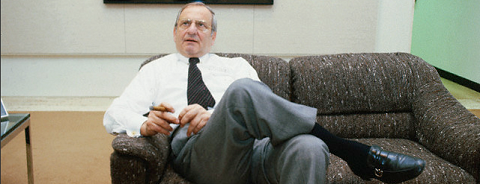 |
| Joe Biden and his boss with the last 2 two-term Vice President's to run for the White House (and their boss). |
Thus it would seem that launching a Presidential campaign after 8 years in the Vice President's office isn't as common, or as advantageous as you may think.
But that certainly isn't stopping Joe Biden from whipping up chatter among political pundits about his own presidential prospects. As early as October 2011, nearly a year and a half before the start of Obama's 2nd term in office, Biden was fanning the flames: "I'm in one of the -- probably the best shape I've been in my life. I'm doing pretty well. I'm enjoying what I'm doing. And as long as I do, I'm going to continue to do it."
And that was far from Biden's last flirtation with 2016. In fact, you could probably spend the better part of a day recounting all the times Biden has noted he's interested in 2016 since taking office as VP in January 2009.
Further buttressing the Vice President’s desire to run for the White House could be the slate of mostly favorable polling that’s come out this year. In 14 hypothetical 2016 match-ups against Republicans Marco Rubio, Chris Christie, Paul Ryan, Rand Paul, and Jeb Bush, Biden only trails in three of them (to New Jersey Governor Chris Christie), and leads by as much as 14 points (against Marco Rubio in a March Marist survey). On average, he leads his GOP opponents by a 46-43% margin and receives a similarly positive overall favorability rating of 45/42% from the American public – not too shabby for a guy who is famous for his lack of discipline, frequent gaffes, and over-the-top theatrics.
Despite all this, Joe Biden and his supporters should exercise cautious optimism regarding early 2016 polling, if any optimism at all. A comparison of his current head-to-head numbers with Al Gore’s in 1997 indicates Joe Biden is slightly weaker than the former Vice President was at a comparable point in the 2000 presidential election.
In 29 surveys taken throughout 1997, Al Gore led his Republican opponents George W. Bush, Elizabeth Dole, Colin Powell, Christine Todd Whitman, Jack Kemp, Dan Quayle, Steve Forbes, Pat Buchanan, Fred Thompson, and Lamar Alexander by an average 46-37%, a stronger result than Biden’s current 46-43% average over his likely GOP opponents.
 |
| The full data set from 1997-1999 was compiled from National Journal, Gallup and various internet searches, and is available here. |
The cautionary tale for Biden kicks in with Al Gore's polling collapse in mid 1998, a trend which continued well into the election year itself. As the Monica Lewinsky scandal began to grate on the public's nerves throughout 1998, "Clinton-fatigue" had found its way to the VP's presidential campaign. Suddenly Bush and the rest of the Republicans were ahead (very frequently by significant margins). From January 1998, through the end of 1999, Al Gore only averaged 40% of the vote in polls, while his GOP opponents (who were winnowed down to just Bush, E. Dole, and McCain) led with an average 49%. The chart below documents the quick erosion in Al Gore's national support in polling as the 2000 Democratic and Republican primaries approached:
While polling eventually tightened again in 2000, it wasn't enough to make Gore Bill Clinton's successor. The election came down to one state, and the rest was history.
Though the 1988 election turned out differently for Bush Sr. than for Al Gore, the early polling looked similar.
Based on the somewhat limited data I was able to retrieve, George H. W. Bush led all of his early potential Democratic opponents in 1985, but gave up the lead in 1986 to Colorado Senator and 1984 Democratic runner-up, Gary Hart, and former Chrysler Corp. Chairman Lee Iocacca (whom I was most interested to learn was seriously courted by some in the Democratic Party as their candidate for President in 1988, and was comparatively strong in hypothetical surveys throughout 1985 and 1986). Like "Clinton fatigue" in '98-99, Bush's poll numbers against Democratic frontrunner Sen. Hart crashed just as President Reagan spoke to the nation admitting his Administration's involvement in the arms for hostages deal.
But a Hart presidency wasn't meant to be, as he dropped out during his national polling peak after it was revealed he had an extramarital affair. By the time Hart re-entered the race in December '87, he was trailing Bush again by double-digits.
Obviously, this simple comparison of polling between two presidential elections isn't meant to imply that what happened then will dictate what happens now. Far too many variables, like candidate name recognition, quality of challengers, effect of incumbency, and volume of polling factor into the equation. But considering the small number of two-term Vice President's to ever run for the top job, you can bet the future 'Biden 2016' higher-ups are at least looking at the Bush '88 and Gore '00 playbooks. And if they give any weight to what they see, they aren't breathing sighs of relief yet.








No comments:
Post a Comment
Note: Only a member of this blog may post a comment.